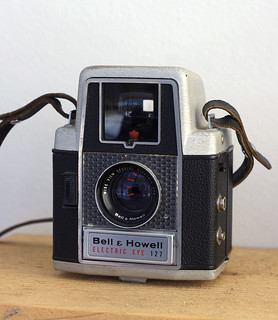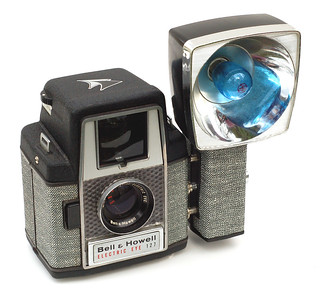Difference between revisions of "Bell & Howell Electric Eye 127"
Hanskerensky (talk | contribs) (Added link to review) |
|||
| (26 intermediate revisions by 9 users not shown) | |||
| Line 1: | Line 1: | ||
| − | + | {{Flickr_image | |
| + | |image_source= http://www.flickr.com/photos/vox/5407963324/in/pool-camerawiki | ||
| + | |image= http://farm6.static.flickr.com/5253/5407963324_3780c3665b_n.jpg | ||
| + | |image_align= right | ||
| + | |image_text= Bell & Howell Electric Eye 127 | ||
| + | |image_by= Voxphoto | ||
| + | |image_rights= non-commercial | ||
| + | }} | ||
| − | The | + | The '''Electric Eye 127''' is a cast metal-bodied box camera for 4x4 cm pictures on 127 rollfilm. It was introduced in 1958 by [[Bell & Howell]]. |
| − | + | The 1938 [[Kodak Super Six-20]] was the first camera to offer photocell-controlled autoexposure, but fewer than 730 were ever sold. Bell & Howell's Electric Eye 127 brought autoexposure to the popular snapshooter market, in a whimsically-styled cast-metal body. | |
| − | [[Category:127 film]] [[Category: | + | A selenium photocell adjusts the two-bladed diaphragm in response to the scene brightness. The automatic exposure control can be overridden by opening the small door below the lens and moving the slide adjuster. |
| + | |||
| + | The Electric Eye 127 was offered in two finishes: black leatherette on a silver body, or grey tweed on a black body. <!-- There is also limited information to support the idea that the Electric Eye was offered with two different lenses. More research needs to made before this can be confirmed.--> | ||
| + | |||
| + | {{Flickr_image | ||
| + | |image_source= http://www.flickr.com/photos/kratz/2409947625/in/pool-camerawiki | ||
| + | |image= http://farm4.static.flickr.com/3081/2409947625_e6fbbe4a4e_n.jpg | ||
| + | |image_align= right | ||
| + | |image_text= Black and tweed version<br/>with matching accessory flash | ||
| + | |image_by= John Kratz | ||
| + | |image_rights= non-commercial | ||
| + | }} | ||
| + | |||
| + | ==Links== | ||
| + | *[https://photojottings.com/bell-howell-electric-eye-127-review/ Bell & Howell Electric Eye 127 review] at [https://photojottings.com/ Photo Jottings] | ||
| + | *[http://books.google.com/books?id=2yUDAAAAMBAJ&lpg=PA152&dq=Bell%20%26%20Howell%20Electric%20Eye%20127&pg=PA153#v=onepage&q=Bell%20&%20Howell%20Electric%20Eye%20127&f=false "New Electric-Eye Camera Takes Foolproof Snaps"] with an explanation of the metering system, ''Popular Science'' magazine, February 1959, pg.152-153, at [http://books.google.com/books Google Books] | ||
| + | *[https://www.westfordcomp.com/the-bell-and-howell-electric-eye-127-c1958/ More views of the tweed version] at [https://www.westfordcomp.com/ www.westfordcomp.com] | ||
| + | |||
| + | |||
| + | [[Category:US 127 film]] | ||
| + | [[Category:E|Electric Eye 127 Bell and Howell]] | ||
| + | [[Category: 1958]] | ||
Latest revision as of 05:02, 24 June 2023

|
| Bell & Howell Electric Eye 127 image by Voxphoto (Image rights) |
The Electric Eye 127 is a cast metal-bodied box camera for 4x4 cm pictures on 127 rollfilm. It was introduced in 1958 by Bell & Howell.
The 1938 Kodak Super Six-20 was the first camera to offer photocell-controlled autoexposure, but fewer than 730 were ever sold. Bell & Howell's Electric Eye 127 brought autoexposure to the popular snapshooter market, in a whimsically-styled cast-metal body.
A selenium photocell adjusts the two-bladed diaphragm in response to the scene brightness. The automatic exposure control can be overridden by opening the small door below the lens and moving the slide adjuster.
The Electric Eye 127 was offered in two finishes: black leatherette on a silver body, or grey tweed on a black body.

|
| Black and tweed version with matching accessory flash image by John Kratz (Image rights) |
Links
- Bell & Howell Electric Eye 127 review at Photo Jottings
- "New Electric-Eye Camera Takes Foolproof Snaps" with an explanation of the metering system, Popular Science magazine, February 1959, pg.152-153, at Google Books
- More views of the tweed version at www.westfordcomp.com